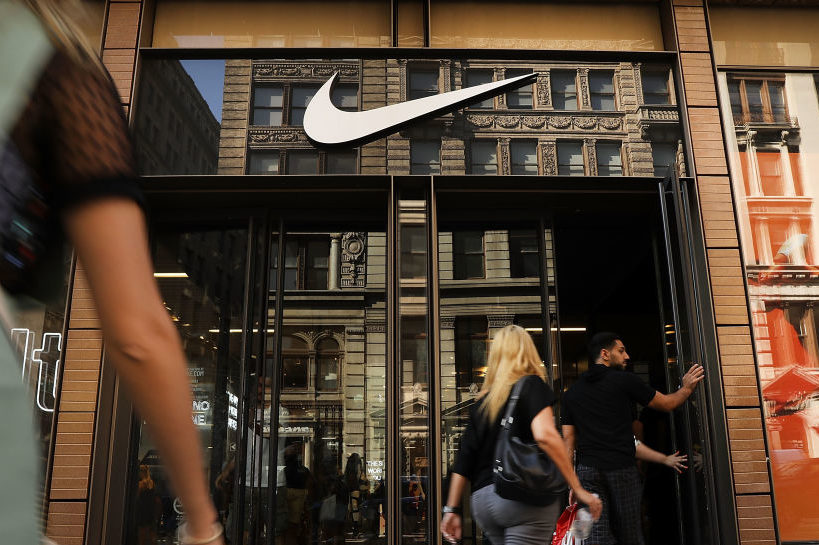Woke corporatism has taken over America. Nike nixed a sneaker launch featuring the Betsy Ross flag after noted anthem-kneeler Colin Kaepernick claimed it was offensive. Coca-Cola and other companies threatened to boycott doing business in Georgia over the state’s new election security legislation. Levi’s allegedly booted its president over her anti-school closure views during the pandemic, and nearly every major retailer features pro-Black Lives Matter or Pride Month messaging on its storefronts and websites.
It can seem impossible as a conservative to avoid giving your hard-earned money to businesses that hate you. Even for moderate or apolitical consumers, it can be frustrating and tiresome to be hit with a wave of political messaging when you’re just trying to purchase a product.
There have been several right-wing responses to the woke tyranny sweeping the corporate world: the Daily Wire has started producing and hosting non-woke films and TV shows and recently launched its own razor brand after Harry’s razors pulled advertising from the media company’s podcasts. 2nd Vote, meanwhile, scores companies based on how well they adhere to conservative principles on issues like abortion and the Second Amendment.
Projects like these are meaningful, but by nature reactionary. They focus primarily on consumer boycotts, which can occasionally affect behavior (see: State Farm), but do not address some of the larger reasons why companies go woke. The rise of ESG (environmental, social and corporate governance) means companies can lose out on capital if they don’t get on board with progressive politics. Even beyond the financial incentives, corporations, employees, and consumers alike have adopted the idea that businesses should provide some sort of value to society beyond just maximizing shareholder profits. The left provided them with the simple value system of wokeness.
Enter New Founding, an organization promising to present a positive alternative to the woke politics invading corporate America. The group is founded by Nate Fischer, the co-founder of a billion-dollar real estate company, and Matthew Peterson, a digital media and political consultant and founder of the Claremont Institute’s American Mind. Fischer and Peterson say that any attempt to fight back against wokeness in the business world and America writ large is inadequate if it doesn’t offer a compelling moral vision to replace the ideology of woke. New Founding is an attempt to provide this vision and reinforce it.
“What wokeness did is offer a compelling moral vision of how we should live and what’s good and evil and what makes us good citizens. And the right has to do the same thing,” Peterson told me.
“If you don’t have an alternative vision of something that’s compelling, this desirable, that’s attractive, then you’re going to lose,” he said.
How does New Founding attempt to realize this vision? Underneath the New Founding umbrella are Principal Investments, an investment firm that provides equity to companies that align with its values, ALIGN, a newsletter and online database for consumers to brands that fit their lifestyle and don’t hate them, RETURN, a publication reinforcing a more pro-human approach to technology and business, and American Firebrand, a Super PAC that focuses on political messaging. New Founding is also working on its own tech platform called The American Forum that intends to supplant Google and Amazon. This is all an appropriately ambitious undertaking for an even more ambitious goal.
What is New Founding’s alternative vision? It doesn’t seem explicitly political on its face, which is by design. Instead, they mostly ask broader questions: does the company love America? Do they create American jobs? Are their products or services of quality and do they contribute to a valuable way of life?
“It’s not limited to the political,” Fischer explained. “It is this fuller vision of what it means to be an entrepreneur or a creative individual.”
Peterson said, “Signing a petition or putting a little insignia to say ‘not woke’ is is not going to be enough. What needs to be built first is an attractive vision of a way of life with people selling products and services where you see it and you go, ‘Aha, that’s what I want’, and no one can even imagine this now.”
Fischer and Peterson challenge the idea presented by some conservatives that the answer to woke corporatism is for companies to return to “neutral”, i.e. drop notions of the political altogether.
“The reason people regarded it as neutral is because everyone sort of agreed on some basic principles and purposes of human society, civilization, America,” Peterson said.
Interestingly, the pair also acknowledge that wokeness poses challenges for companies and employees beyond just the political. Categorizing people into identity groups rather than treating them as individuals makes employees more predictable and easier to manage, Fischer argues, but it also kills creativity and innovation.
“Organizations that reduce people to numbers in spreadsheets are very good at optimization and producing efficiency,” Fischer said. “But what they’re not as good at is actually encouraging the dynamism to create long-term innovation that creates long-term value.”
“It’s really failing to appreciate the richness that humans can bring when some of their creative potential is unlocked, that a craftsman can bring, that an individual manager or leader could bring within a particular community. And so I think you’ll see on both the employee side, the productive side, and on the product side, you’ll see a much richer product if they embrace that,” he asserted.
While massive corporations might not immediately jump on board with this approach, Fischer and Peterson are betting that small-to-medium-size businesses and family-owned operations are going to find it very attractive.
New Founding has a long way to go, but Fischer and Peterson seem committed and optimistic. Fischer has put a “substantial amount” of his own money into the organization and the duo are currently raising additional funds from individual investors.
“I think this is necessary for my kids to have a future. I also think it’s the greatest business opportunity that I’ve seen in my lifetime,” Fischer said.

























